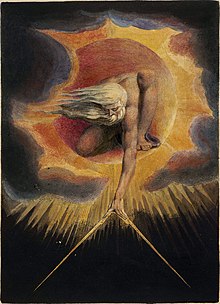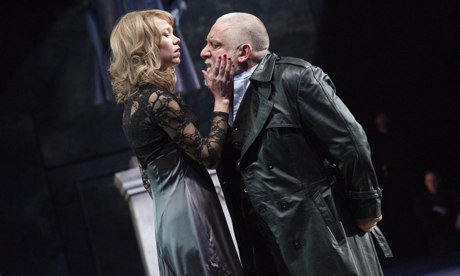
Sam Mendez wonderful production of King Lear in a militarized state. (The fool and Kent converse.)
Note from Mr C:
Our Principal, Mr Don Gardner, shared his memories and insights of many performances of 'King Lear' recalled from his frequent visits to Stratford over the last few decades.
These special classes for HL1 and HL2 presented students with an excellent opportunity to deepen their own understanding of the text and prepare for a 3 hour viewing of the play.
Our HL students have posted their responses to those classes and our visit to the NCPA to attend the screening of Simon Russell Beale's powerful performance in a National Theatre UK Production directed by Sam Mendez. I am posting Mira Tiwari's reflection here to share with teachers and students and our wider audience for this blog. It's a remarkable piece of writing which conveys so much about the play and conveys it all with a strong personal response to Mr Gardner's teaching and the play as performance. It was emailed to me for inclusion in the comments section but I think it deserves a special place here in the main body of the post. Well done Mira! Indeed congratulations to all students who have posted here meaningful and personal responses to this great play. My thanks to Mr Gardner, who inspires us all with his love of Shakespeare and whose vision led to our special assembly to mark the 450th anniversary of Shakespeare's birthday in April 2014
Comment from MIRA TIWARI.
During a recent English class Mr. Gardner suddenly burst out
“King Lear!” and proceeded to ask us, wide-eyed and wholeheartedly, “Can you imagine some
people live their whole lives without ever experiencing King Lear?”
At the time, we all exchanged looks and giggles, well aware
of Mr. Gardner’s appreciation of the play and of Shakespeare but unable to
place so much life-changing importance on the little book. Now, a few
weeks later, I have paused to think what my life would be like without King
Lear and I realise (or rather, am beginning to realise) the effect such a play
can have.
Reading the play and studying it in class already made me
enjoy it – the characters’ developments, the connections with people I know,
the snide little insults, the poignant monologues and the passages of touching
description. But a play has the feature (both an advantage and a disadvantage)
or lacking much explicit description. If novels lend themselves to the reader’s
imagination, plays rely on it almost exclusively. Personally, my imagination is
incapable of conjuring up too much at one time; either I am picturing Goneril’s
face and King Lear’s reaction, or the stage directions and the movements of the
background characters, but rarely, if ever, both at the same time. In addition,
Shakespeare’s language is not the most accessible, especially for beginners,
and the often strange use of punctuation can make it even more difficult to
decipher who is being addressed, when, and where some phrases end and others
begin. Watching the National Theatre’s production of King Lear helped with all
of these problems: it clarified the situations, it strengthened the characters,
it emphasised the language and it brought the play to life.
Certain things surprised me, perhaps above all Act I Scene I
– ironic, because this is the scene we studied the most. I didn't anticipate
such a cold, distant setup onstage, dictatorial with the microphones and tall
chairs. I imagined something slightly more active, with a certain amount of
familial closeness. But perhaps this was just a preconception created by the
cover of our copy of King Lear, which shows a bright painting of Lear holding
Cordelia in his arms. I came later to realise that Sam Mendes’ interpretation
was actually rather appropriate, because it was this militarism and strictness
that helped enable Goneril and Regan to orchestrate Lear’s eventual
downfall.
Regan’s character also surprised me, even though Mr. Gardner
had already told us about her sensual and playful portrayal. At first it seemed
incongruous in Act I Scene I, coupled with an unexpected playfulness from Lear
too. But as the play progressed I understood the relationship Sam Mendes had
created, one of Regan being “Daddy’s girl” insofar as it benefited her, leaving
Lear with a false sense of security and daughterly love. Regan essentially had
Lear wrapped around her finger, which served to emphasise Goneril’s
comparatively ‘real’ interactions and Cordelia’s almost idyllic but initially
under-appreciated relationship with her father. Goneril was so accurate in her
expressions and speeches that she made me at times sympathetic with her,
understanding of the chaos taking over her home. Edmund was extremely powerful,
sweeping the audience up in his monologues and pulling them, if only
momentarily, on to his side. He captured the manipulation and the eloquent
monologues, such that I went from being engrossed in his latest plan to being
moved by his speech about astrology. I agree with what Sam Mendes said about
Simon Russell Beale being better suited to acting a kinder part, as I
particularly enjoyed the later part of the play, when King Lear gets
increasingly madder. Beale really managed to bring out the most delicate
nuances, from a little gasp caught in his throat, to a fearful daze in his
eyes, to the compulsive rubbing of his knee, to whispered words, sometimes of
worry and at other times of reassurance. He took the audience into Lear’s mind
and transformed himself entirely into a devastated, hopeful, neglected, loved,
conscious, mad and desperate father and King.
Before watching the play I didn’t have much of an
understanding of Kent and the Fool, but seeing them as real people instantly
changed that, making them two of my favourites. Things like accent, dances and
facial expressions made them rather enjoyable and I think they helped tie the
play together through their moving, intimate bond with Lear. Similarly,
Edgar/poor Tom was vibrantly acted, highlighting and giving him the
significance his character deserves and making the ending all the more
effective. I finally understand what people mean when they say “Shakespeare is
modern.” because so many of the lines of the play have resonated with me,
especially after watching it. I find myself connecting real personalities,
relating it to movies, books and TOK. And, whether I’m studying logarithms in
maths or DNA in biology, I can’t even read the word ‘base’ anymore without
replaying “With base? with baseness? bastardy? base, base?” in my head. Posted by Mira Tiwari.
 SIMON RUSSELL BEALE conveyed the majesty and the tragedy of Lear's downfall
SIMON RUSSELL BEALE conveyed the majesty and the tragedy of Lear's downfall.
STUDENT REFLECTIONS ON THE PERFORMANCE SHOULD BE POSTED HERE BY TUESDAY JUNE 3RD. 300 - 400 WORDS MINIMUM PLEASE.
Thank you to all students who have posted below here - click on comments to see them.












